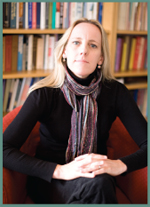Humanism isn’t absolute but we can still ask: How can humanists best comport themselves?

WHEN SEARCHING for the right words to paint some stripe of human behavior, I find it’s so often true that Mark Twain said it best. “Travel,” Twain wrote in The Innocents Abroad in 1869, “is fatal to prejudice, bigotry, and narrow-mindedness, and many of our people need it sorely on these accounts. Broad, wholesome, charitable views of men and things cannot be acquired by vegetating in one little corner of the earth all one’s lifetime.”
Something else Twain wrote in that book was, “The gentle reader will never, never know what a consummate ass he can become until he goes abroad. I speak now, of course, in the supposition that the gentle reader has not been abroad, and therefore is not already a consummate ass. If the case be otherwise, I beg his pardon and extend to him the cordial hand of fellowship and call him brother.”
Were Twain around today, he’d surely shake hands with the four Pathfinders of this issue’s cover story and call them brothers and sisters for having been abroad with grace and integrity intact. The Pathfinders Project, as readers will learn, is a burgeoning international service program sponsored by Foundation Beyond Belief to establish a kind of humanist
Peace Corps. But whereas the Peace Corps aims to expose people around the world to citizens of the United States and vice-versa, Pathfinders Project wants to expose humanists to people and cultures in other places and expose people in those places who are unfamiliar with humanism to humanists.
In her article, “Paths to People,” Pathfinder Wendy Webber describes her experiences teaching in Uganda and asks, “How do you teach religion in a humanist school in a coercively Christian nation?” This sums up the challenge and the beauty of an endeavor like the Pathfinders’.
In addition to the teaching roles Webber details, the group has traveled to eight countries on four continents to install wells; construct latrines; write grants; advise on clean water systems, organic farming, and the implementation of local farmers markets; and, in Northern Ghana, to assess human rights violations against people exiled for alleged witchcraft. But key to these efforts is the awareness that they’re not going from one foreign, underdeveloped place to another to fix things, nor is it about the experiences or transformations they undergo as volunteers. On the contrary, writes Pathfinder Conor Robinson in response to criticism of so-called voluntourism, “sustainable change does not mean taking the lead, but empowering locals to do so. It means asking residents what problems they have identified and helping them acquire the resources to implement solutions.” Writing on his blog, Godless Pilgrim, Robinson describes setting up latrines in Haiti after international aid money disappeared into politicians’ pockets. “We helped the residents of La Fond-Jeannette get the materials and then they taught us how to build the latrines.”
A common thread runs through other articles in the issue at hand, posing the question: How can one best be of the world while also recognizing one’s privileged place in it and even do something to improve things? For one, we can promote the concept of benefit corporations, which factor people and the planet into the assessment of profits. We can be mindful of our own particular brand of materialism, embrace a cosmopolitan mindset, and recognize principles of economic justice in the doctrine of those we may otherwise oppose. Humanism isn’t absolute but we can still ask how humanists might best comport themselves. Herein lies one path.
